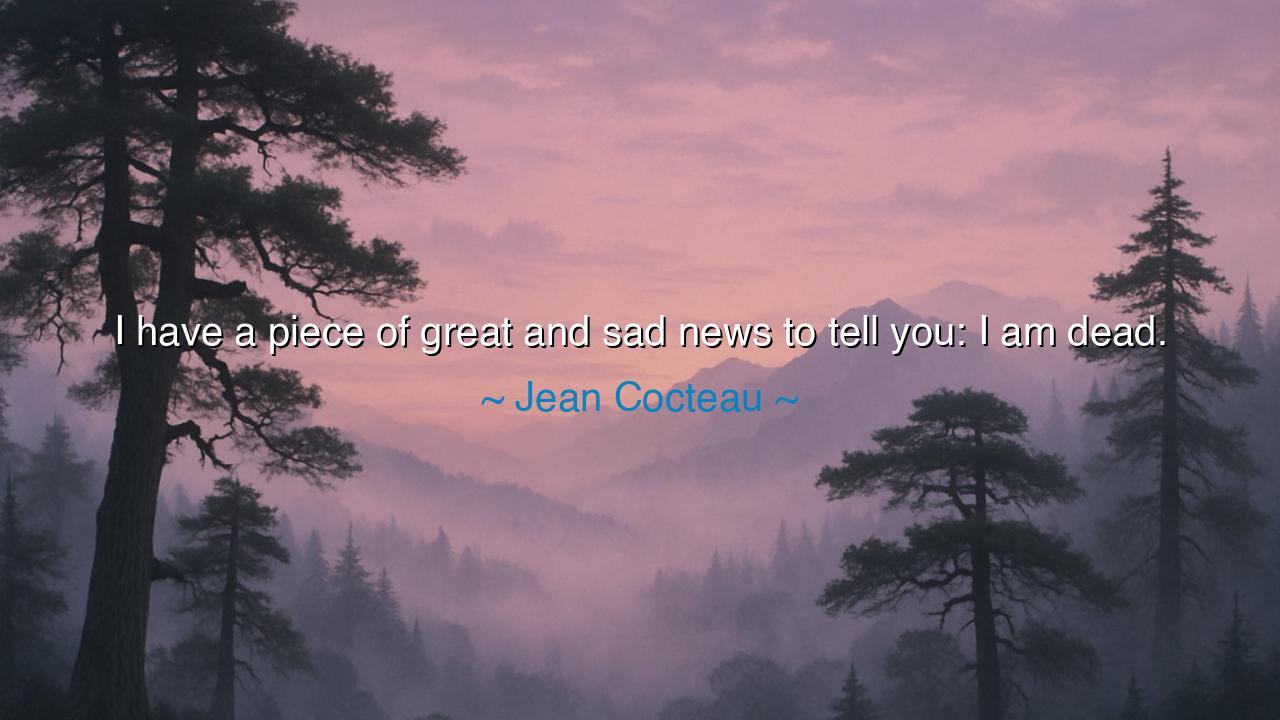
I have a piece of great and sad news to tell you: I am dead.






There is haunting beauty in the words of Jean Cocteau, who wrote, “I have a piece of great and sad news to tell you: I am dead.” In this single, chilling sentence, the poet did not speak merely of physical death, but of transcendence, of the strange passage between life and eternity. It is both an announcement and a revelation — a whisper from the border of existence, where the artist, aware of his own mortality, embraces it not with fear, but with poetry. Cocteau’s words are both great and sad because they contain a paradox that all humans must one day face: that the end of life is at once a sorrow and a liberation, a silence and a continuation, a tragedy and a triumph.
The origin of this quote lies in Cocteau’s final moments. On the day of his death in 1963, upon hearing of the passing of his dear friend Édith Piaf, he is said to have exclaimed these words before collapsing himself. It is as though, in that instant, art and mortality intertwined — two souls of creation departing in harmony, leaving behind echoes that would outlive their bodies. Cocteau, a visionary poet, filmmaker, and playwright, had always lived close to the threshold between the real and the surreal. His works blurred the line between dream and truth, life and art. In saying “I am dead,” he was not merely announcing his own departure — he was acknowledging the mystery of transformation, the crossing from one form of being into another.
To the ancients, this acceptance of death was not despair, but wisdom. The philosopher Socrates, before drinking the hemlock, spoke calmly to his disciples about the immortality of the soul. He saw death not as annihilation, but as awakening — the moment when the soul is freed from the confines of the body to contemplate truth in its purest form. Likewise, Cocteau’s final declaration carries the same sense of serene awareness. His “sad news” is human, tender — the acknowledgment of parting. But his “great news” is divine — the recognition that the spirit endures, that art, love, and consciousness do not perish with the flesh.
There is, too, a poetic irony in Cocteau’s phrasing. To say, “I have news to tell you: I am dead,” is to speak from beyond — a final gesture of artistic defiance. It is as if he refuses to let death silence him. Even in dying, he speaks, turning his own absence into a message. This act is deeply symbolic of the artist’s eternal struggle against oblivion. Throughout his life, Cocteau sought to capture eternity through expression, to carve immortality from language and vision. His last words were his final creation — the perfect synthesis of art and death, a farewell crafted with the elegance of a poet who knew that he would live on through his words.
History is rich with kindred spirits who shared this awareness. Leonardo da Vinci, on his deathbed, murmured that he had “offended God and mankind by failing to practice more of his art.” Yet in those words, there was no despair — only humility before the infinite. He, too, understood that death is not erasure, but continuation through legacy. The poet Rainer Maria Rilke wrote his own epitaph: “Rose, O pure contradiction, joy of being no one’s sleep under so many lids.” Like Cocteau, he embraced the inevitability of death not as a final darkness, but as a new and unknowable form of beauty. To those who live fully, death does not come as a thief, but as a transformation of being.
Cocteau’s declaration is therefore not a cry of finality, but a revelation of immortality through creation. The one who lives deeply, who gives their soul to art, to love, or to truth, never truly dies. For the world remembers the essence of their spirit long after their body is gone. The sadness he speaks of belongs to those who remain — to the living, who must grieve. But the greatness lies in the eternal — in knowing that what was once bound by time now belongs to eternity. His “news” is a paradox wrapped in poetry: he is gone, and yet, by speaking, he is still here.
The lesson, my children, is both solemn and luminous: do not fear death; fear only a life unlived, a gift unused, a soul unexpressed. For death comes to all, but immortality belongs to those who create, who love, who give themselves fully to the moment. When the end approaches, let your last words, like Cocteau’s, carry the weight of meaning, the light of understanding. Live in such a way that when you say “I am dead,” the world will still hear your voice — through your deeds, your art, your kindness, your courage.
For in the end, Jean Cocteau teaches us that death is not the end of the conversation, but the final verse of a song whose echo never fades. The body falls silent, yes — but the spirit continues to speak. And perhaps, when we too stand at the edge of eternity, we shall whisper as he did — not in fear, but in awe — that the great and sad news of our mortality is, in truth, the beginning of our immortality.






AAdministratorAdministrator
Welcome, honored guests. Please leave a comment, we will respond soon